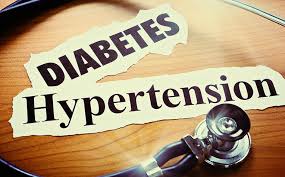The rising prevalence of high blood pressure (hypertension) and diabetes at the Sunyani Teaching Hospital in Ghana has become a cause for alarm, as highlighted by Pastor Jefferson Kwasi Agbotro, a medical professional at the facility. These two non-communicable diseases account for a staggering 70% of all outpatient department (OPD) cases, emphasizing the urgent need for intervention and preventative measures. The sheer volume of hypertension and diabetes cases represents a significant burden on the healthcare system, necessitating a multi-pronged approach encompassing public awareness campaigns, lifestyle modifications, and improved access to affordable healthcare.
Historically associated with older adults, hypertension is now increasingly affecting younger individuals, a worrying trend that demands immediate attention. This shift in demographics suggests that contributing factors, such as unhealthy diets, sedentary lifestyles, and chronic stress, are impacting younger generations. The long-term implications of early-onset hypertension are significant, increasing the risk of cardiovascular diseases, stroke, and kidney failure later in life. Addressing this issue requires a comprehensive strategy that targets young people with preventative education and promotes healthy habits from an early age.
Both hypertension and diabetes carry significant psychological and physical ramifications. Uncontrolled hypertension can lead to debilitating headaches, heightened stress levels, and depression, while diabetes can result in nerve damage, vision problems, and even amputation of limbs. These consequences not only impact individual well-being but also place a strain on families and communities. Effective management of these conditions is crucial to mitigate the devastating effects and improve the quality of life for those affected. This emphasizes the importance of regular health check-ups, adherence to prescribed medications, and ongoing support from healthcare professionals.
Pastor Agbotro, also the CEO of Friends of Health Association (FOHA), a non-governmental organization, underscores the crucial role of preventative measures, particularly for families with a history of hypertension. Dietary choices are paramount, and individuals are urged to adopt a healthy eating pattern, limiting processed foods, sugary drinks, and excessive salt intake. A balanced diet rich in fruits, vegetables, and whole grains is vital for maintaining optimal health and bolstering the immune system. Furthermore, regular physical activity, stress management techniques, and adequate sleep are essential components of a healthy lifestyle that can help prevent the onset of these chronic conditions.
Individuals diagnosed with diabetes must prioritize meticulous management of their condition to minimize the risk of complications, including kidney disease. This involves regular monitoring of blood glucose levels, adherence to prescribed medication regimens, and adopting lifestyle changes such as regular exercise and a healthy diet. Education and support from healthcare providers play a crucial role empowering individuals with diabetes to effectively manage their condition and prevent long-term complications. Support groups and community-based programs can also offer valuable resources and emotional support for individuals navigating the challenges of living with diabetes.
Addressing the rising tide of hypertension and diabetes requires a collaborative effort involving healthcare professionals, government agencies, non-governmental organizations, and individuals. Public awareness campaigns are essential to educate communities about the risk factors, symptoms, and preventative measures associated with these diseases. Promoting healthy lifestyles, providing access to affordable healthcare, and supporting ongoing research are crucial steps in combating these prevalent non-communicable diseases and improving the overall health of the population. Early detection and intervention are key to preventing long-term complications and ensuring a healthier future for all.


